 During the Ming Dynasty, the Hakka people in rural China lived in giant fortified buildings, encompassing entire villages. Lead your family to glory as you make your way around the Round House, doing business, consulting experts, and worshipping at the temples.
During the Ming Dynasty, the Hakka people in rural China lived in giant fortified buildings, encompassing entire villages. Lead your family to glory as you make your way around the Round House, doing business, consulting experts, and worshipping at the temples.
What Is Round House?
Round House is a Euro game for 2 to 5 players, ages 10 and up, and takes about 60 to 90 minutes to play. It was originally published by Taiwanese publisher EmperorS4 in 2016; Deep Water Games has partnered with EmperorS4 to publish North American editions of its games. Round House will be offered as part of the Kickstarter campaign for Mystery of the Temples as a $49 add-on. (See Dave Banks’ review of Mystery of the Temples here.) The game doesn’t really have anything inappropriate for younger kids, but because of the length and complexity, I would recommend it mostly for older or more experienced kids and adults.
New to Kickstarter? Check out our crowdfunding primer, and visit our Kickstarter curated page for more projects we love.

Round House Components
Note: My review is based on the EmperorS4 edition; the Deep Water Games edition will have an updated rulebook but will otherwise be more or less the same. My understanding is that Deep Water Games would like to do a second edition that has more significant changes, but that’s not definite yet. Personally, I’d love to see an updated version with some better graphic design on some of the elements, but it’s also not a guarantee that if you wait until later there will be a second edition made.
Round House includes:
- Game board
- 8 Action tiles (3 large, 5 small)
- 1 Traveling Merchant tile
- 1 Ancestral Hall stand
- 10 Pirate tokens
- 4 Temple tokens
- 18 Amulet tokens
- 20 Order cards
- 24 Expert cards
- 5 Player boards
- 10 Family Leader pawns (2 per player color)
- 75 Assistant tokens (15 per player color)
- 50 Coins (30 $1, 20 $3)
- 55 Resource cubes (15 each tea, fruits, celadon; 10 gold)
- 1 Round Marker token
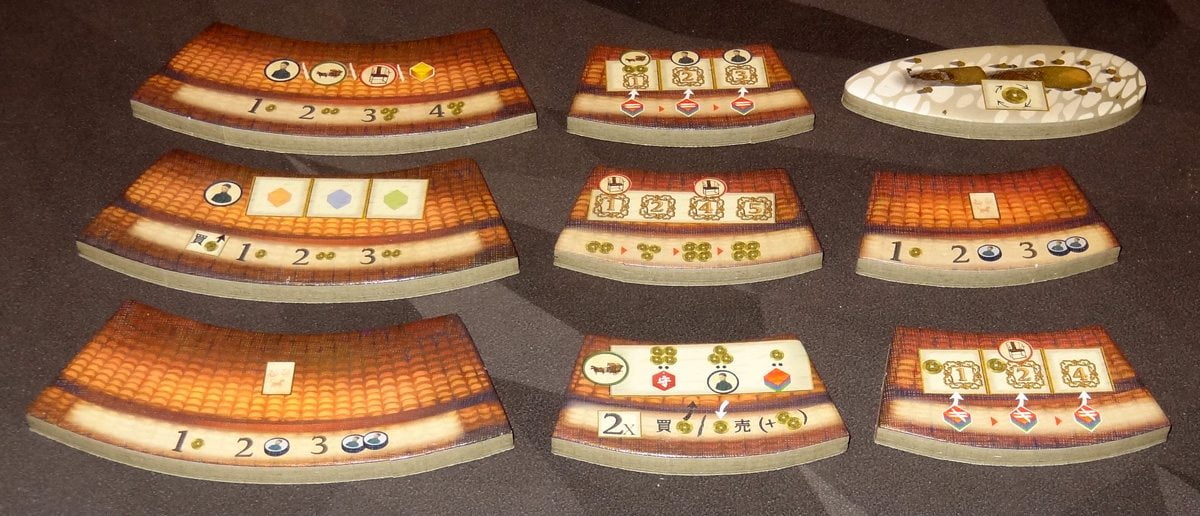
The components are of a mixed quality. My game board was a little warped, and so it didn’t lay flat on the table, which was somewhat annoying. But the action tiles and traveling merchant tiles are extra-thick cardboard, huge and chunky–they almost feel like they’re wooden blocks. The artwork depicts a top-down view of the round house, with an inner ring and an outer ring, and various icons everywhere. For the most part, the icons made sense after reading through the instructions, though there were a couple (like the Black Market) that were a little more confusing.
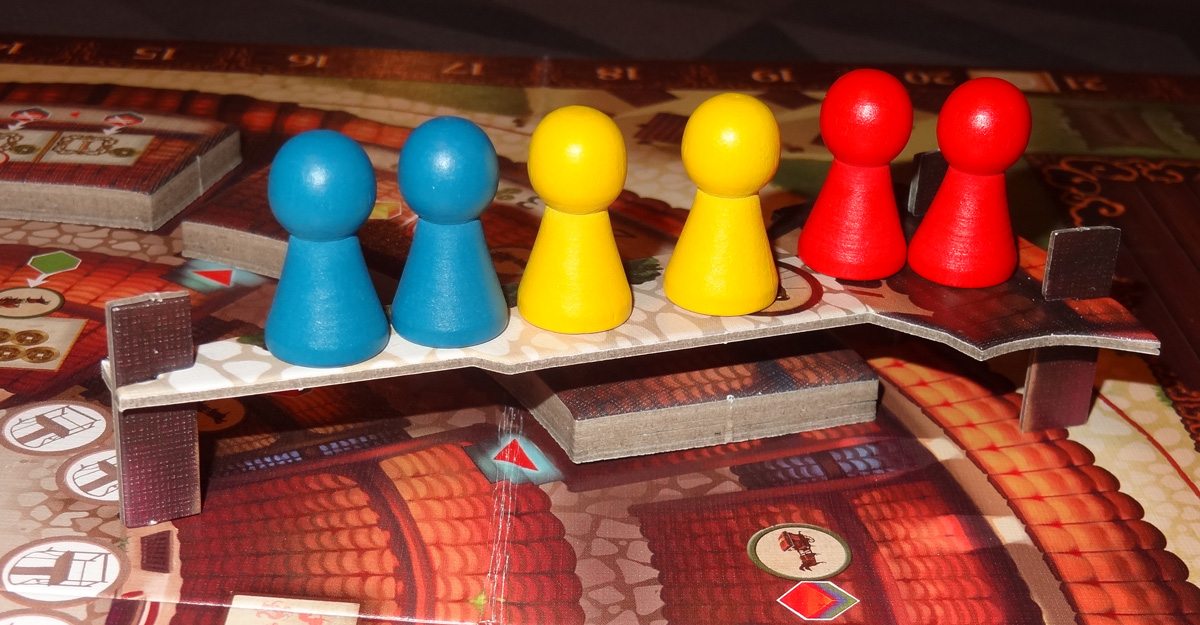
The Ancestral Hall is a wedge-shaped piece of cardboard that has some legs that slot onto it, making a raised platform that can be positioned on the board over the action tiles. The artwork and design for the game is nicely done and definitely helps to immerse players in the world of ancient China. The money consists of coins and yuanbao, the boat-shaped ingots used in imperial China. The amulet tokens depict various amulets and jewelry that fits the theme.
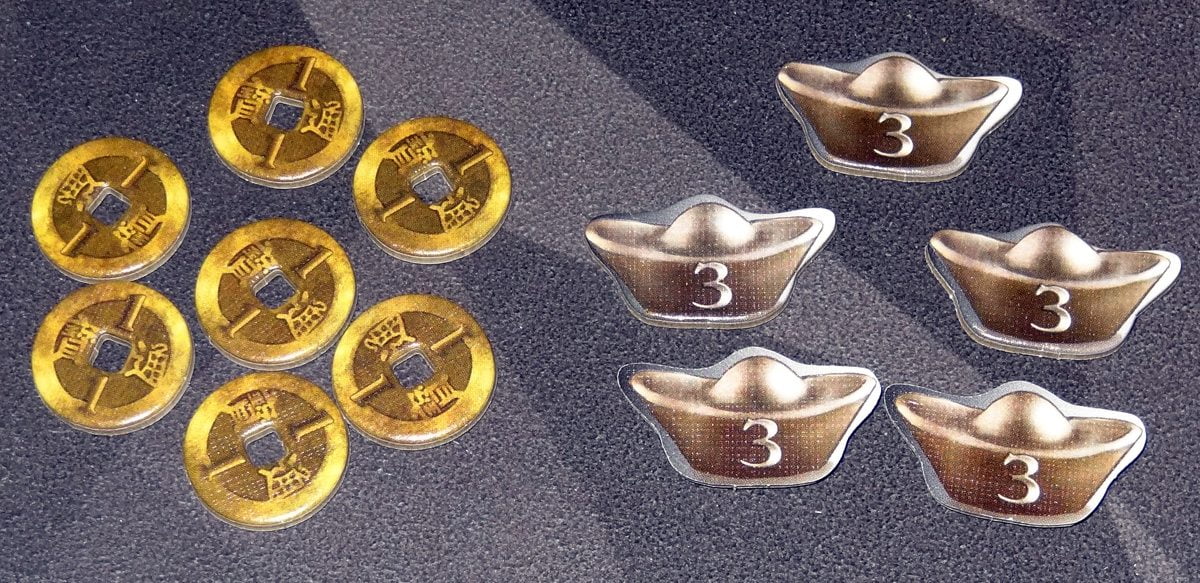
There are some things that are either odd or annoying, though. The scoring track around the board is oddly spaced, with strange gaps near the corners; we also found that although the track only goes up to 50 points, we often scored much more than that–in one game, one player reached 200 points.
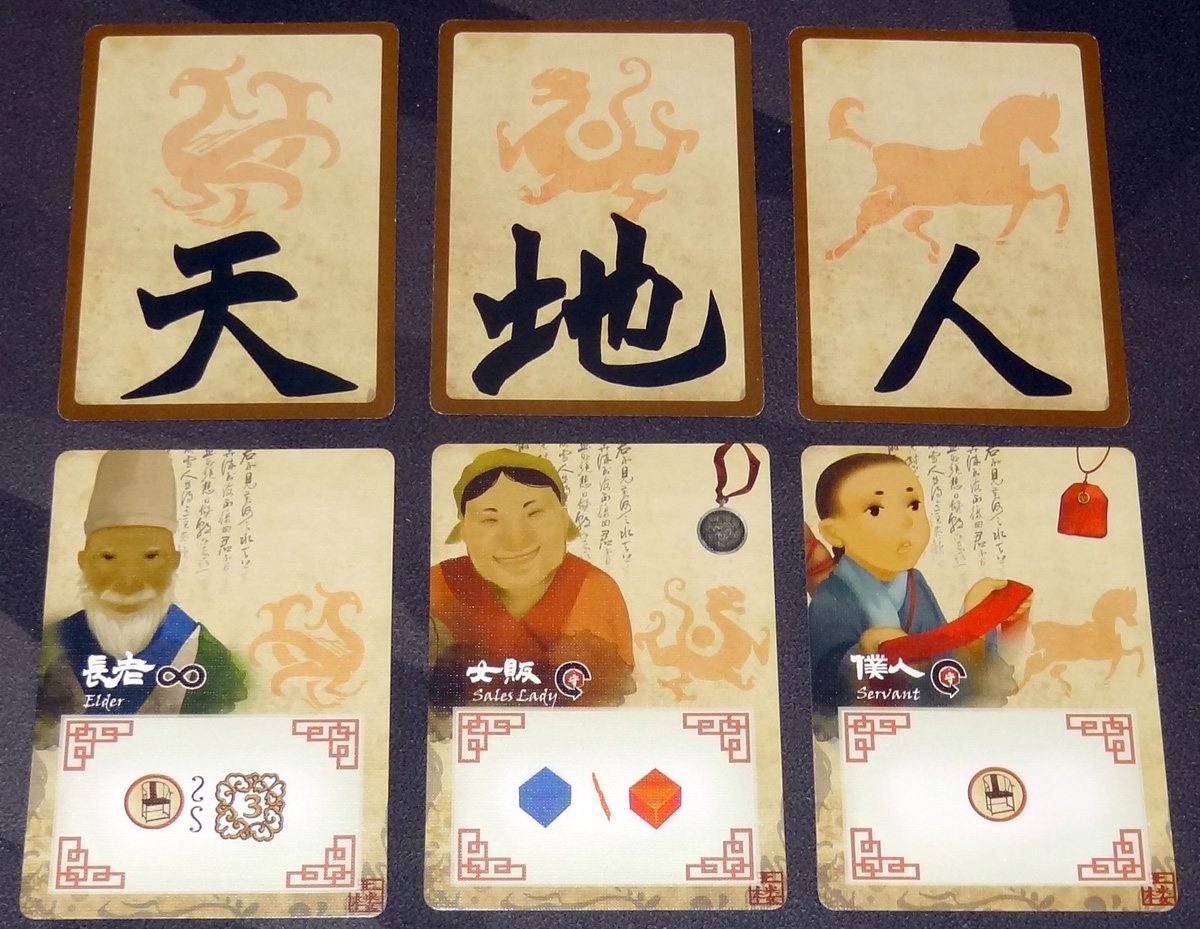
Another odd design element is that the expert cards come in three different families, which have different card backs–but they’re all shuffled together, and it wasn’t immediately clear to me how they were grouped or why it was important that the card backs be different. The scoring chart for the amulets (which score based on sets of unique amulets) goes up to 11 amulets, but as far as I could tell, there were only 9 different types. That seemed a little strange.
I wondered how well the resource tokens and order cards would work for color blind players, given that they use red, green, blue, and yellow. Although the various colors are supposed to represent different resources, even on the order cards they are just shown as colored cubes rather than the items they are supposed to represent.
Initially I had a complaint that the resource cubes (red, blue, green, yellow) overlapped the player colors (red, blue, green, yellow, purple) because unless there’s some tie between a particular player and a particular resource, that can just get confusing. As it happens, in a two-player game the red, blue, and green pawns are actually tied to the red, blue, and green resources, so that actually makes sense. The downside is that in a 2-player game you must use yellow and purple as the player colors.

The assistant tokens are small wooden disks, and each has a younger side and a senior side. Before you play, you will actually need to sticker all 75 tokens. Yep–that’s 150 stickers you get to apply to these little disks. (Or at least 75, if you just want to sticker the senior side only.) So be sure to allow yourself some time for that!
The game uses a little swirly wingding to indicate something you get–it’s a little strange because it could easily just have been an arrow or a colon instead. Point values are indicated with a number in a fancy ornamental square, which I think could be more legible if the numbers were more distinct from the decoration.
Despite this long list, most of these are fairly minor gripes. The game’s icons, although somewhat strange, did end up being fairly easy to understand for the most part. The most significant complaint I had was about the warping of the board; I plan to try pressing it under a big stack of books to see if that could help flatten it out more.
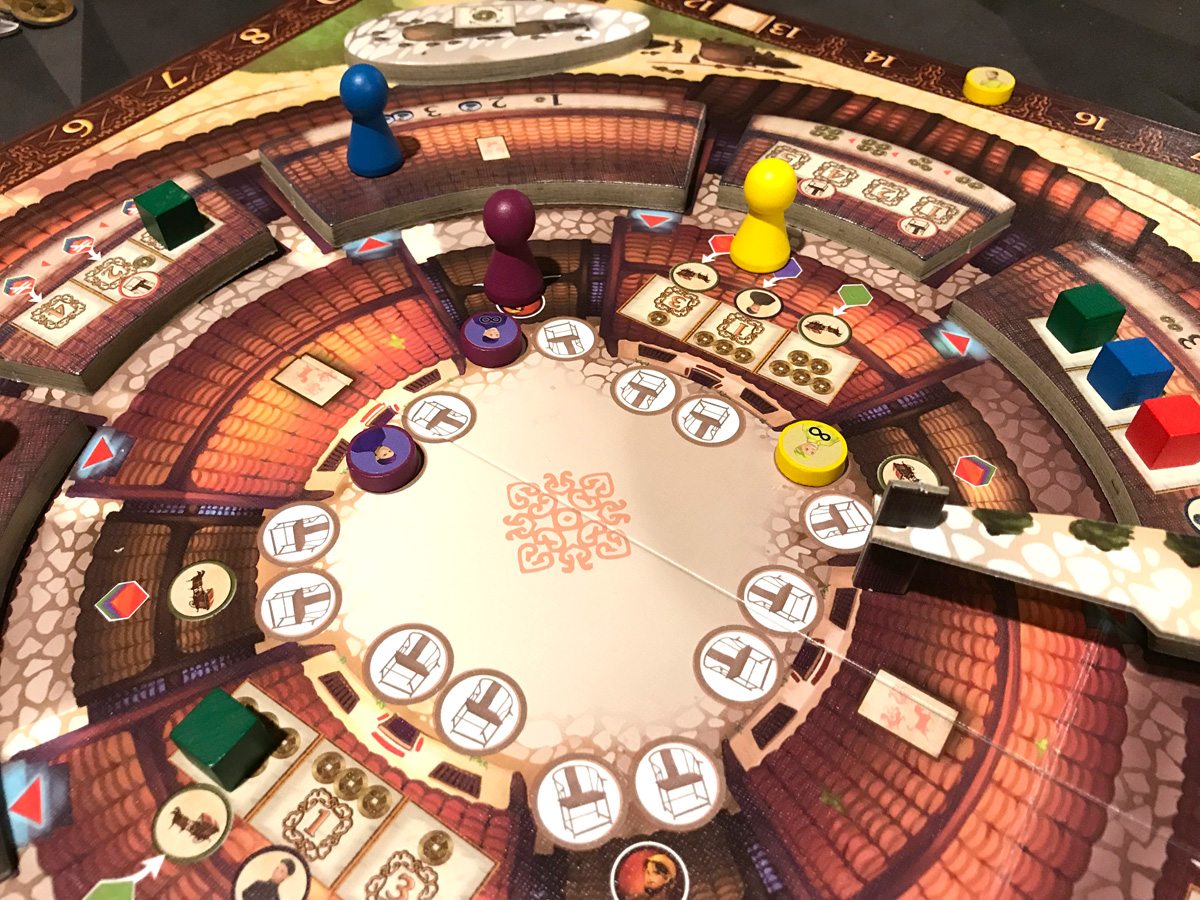
How to Play Round House
You can download a copy of the (EmperorS4) rulebook here.
The Goal
The goal of the game is to score the most prestige, which can be earned in various ways.

Setup
Place the board in the center of the table, and shuffle the action tiles and place them on the empty spaces on the round house. The traveling merchant is placed at the bottom right village (there are four villages in the four corners surrounding the round house). The ancestral hall is placed by the last player—pictured above is the default starting location for new players. Everyone places their family leader pawns on the ancestral hall. (In a 5-player game, each player only uses 1 family leader pawn.)

Each player gets a player board and all of their assistant tokens, which are lined up across the top of the board in the spaces provided. The 5 remaining assistants are placed in the supply area. Each player also gets 1 gold resource, and a number of coins (based on the turn order). Finally, each player gets a starting order card—any remaining starting order cards are shuffled into with the rest of the order cards.
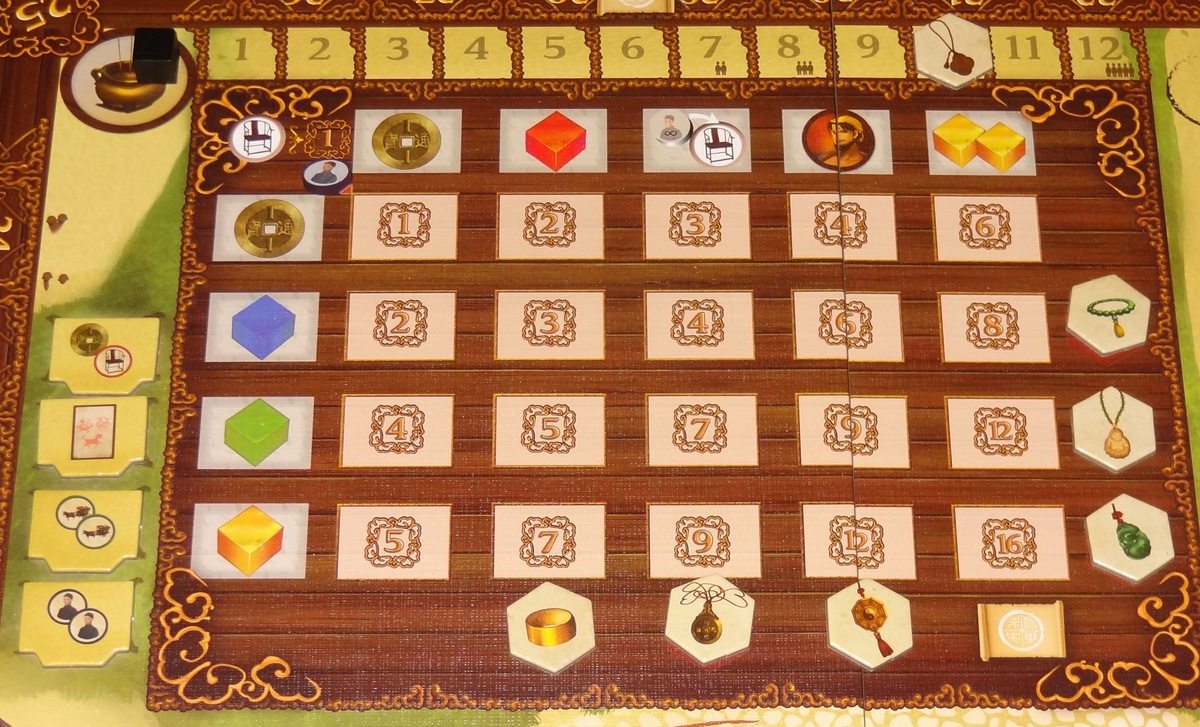
On the temple area on the board, place the four temple tokens face-up on the four spaces to the left of the grid. Shuffle the amulet tokens, and place one (face-up) on each of the amulet spaces on the bottom and right of the grid, as well as one amulet on the round track corresponding to the number of players. Finally, place the round marker cube to the left of the round track.
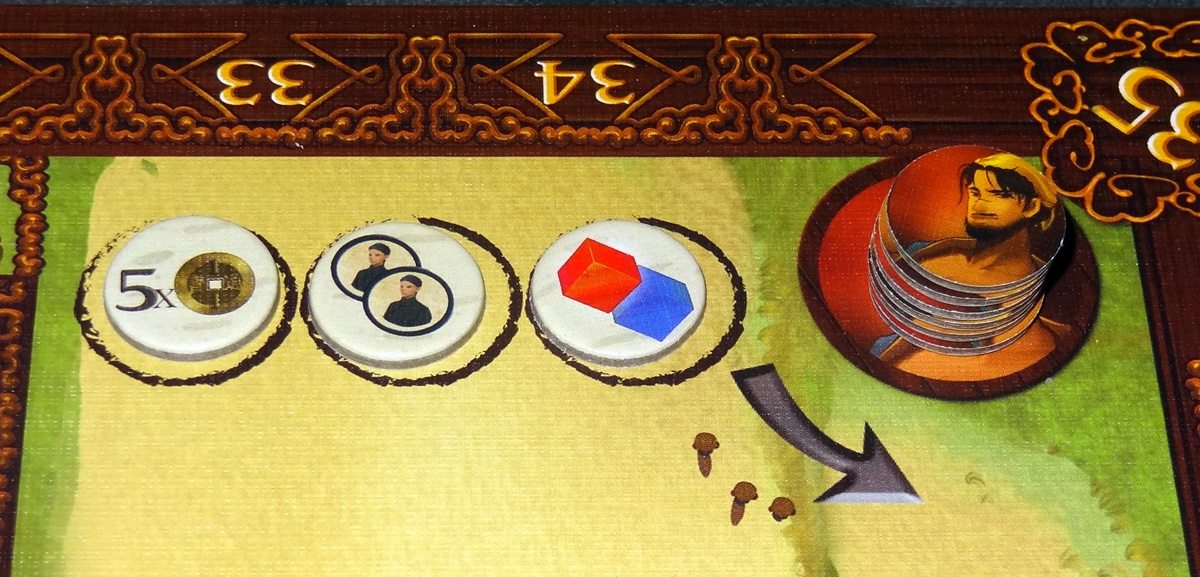
Next to the temple, place the pirate tokens—shuffle them, and turn the top three face-up.
Shuffle the expert cards—yes, all of them, even though they have different backs—and place them next to the board, turning three of them face-up. Place the stack of amulet tokens next to the board, with three turned face-up. And shuffle the order cards (which also have different backs), turning three of them face-up.
Gameplay
On your turn, you do the following steps in order. The only step that is mandatory is moving your family leader; all other steps are optional.
- Activate one expert card.
- Move your family leader.
- Perform the room action.
- Gain bonuses.
- Fulfill orders.
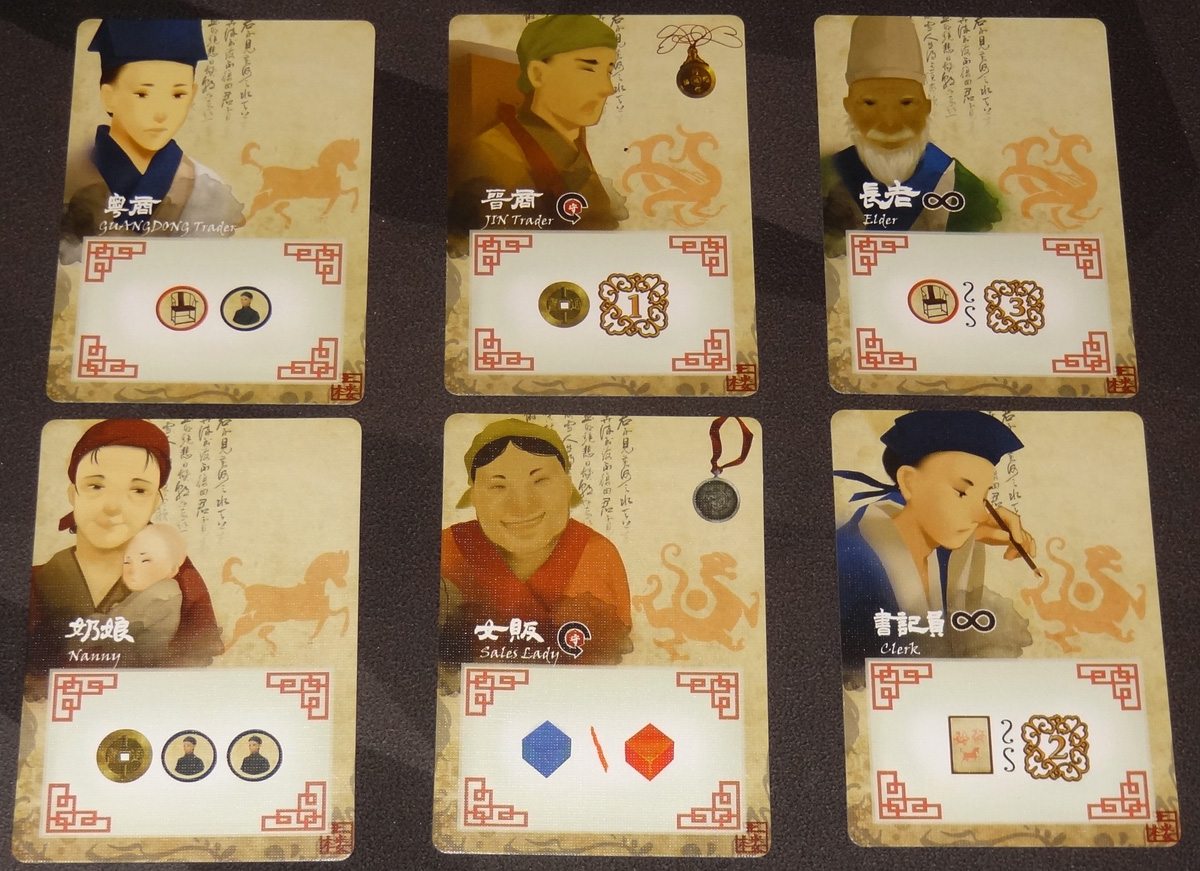
Activate an Expert
You may have up to 3 expert cards at one time, placed below your player board. You may discard an expert to the bottom of the deck in order to free up space when acquiring more expert cards.
Each turn, you may use one non-passive expert card. Expert cards have various effects: many of them will give you some combination of resources, points, or actions (such as hiring, placing assistants, or using a traveling merchant), and generally are discarded after use. Some (the center column pictured above) have amulets pictured in the top corner: these are set aside after use and will count toward your amulet collection at the end of the game.
Some expert cards (the right-most column pictured above) have an infinity symbol: these provide passive bonuses as long as you have that expert below your player board, and do not need to be “activated” each turn. For instance, the Elder pictured above will give you 3 points each time you use the “place an assistant” action.

Move Family Leader
You must move one of your family leader pawns 1, 2, or 3 spaces clockwise in the round house. Pawns may travel around the outer ring or the inner ring, and may only switch between the rings on the blue stairs, following the arrows. (I suppose they’re like escalators, because they’re one-way stairs.) You may pass through other family leaders, but may not end your movement with any other family leader.
If you move onto the ancestral hall, you must stop and take the worship action—more on that later.
In a 2-player game, the red, blue, and green pawns are neutral family leaders—instead of moving your own pawn, you may spend a matching colored resource to move one of the neutral leaders instead as if it were your own. Neutral family leaders do not stop on the ancestral hall—they skip over it instead.
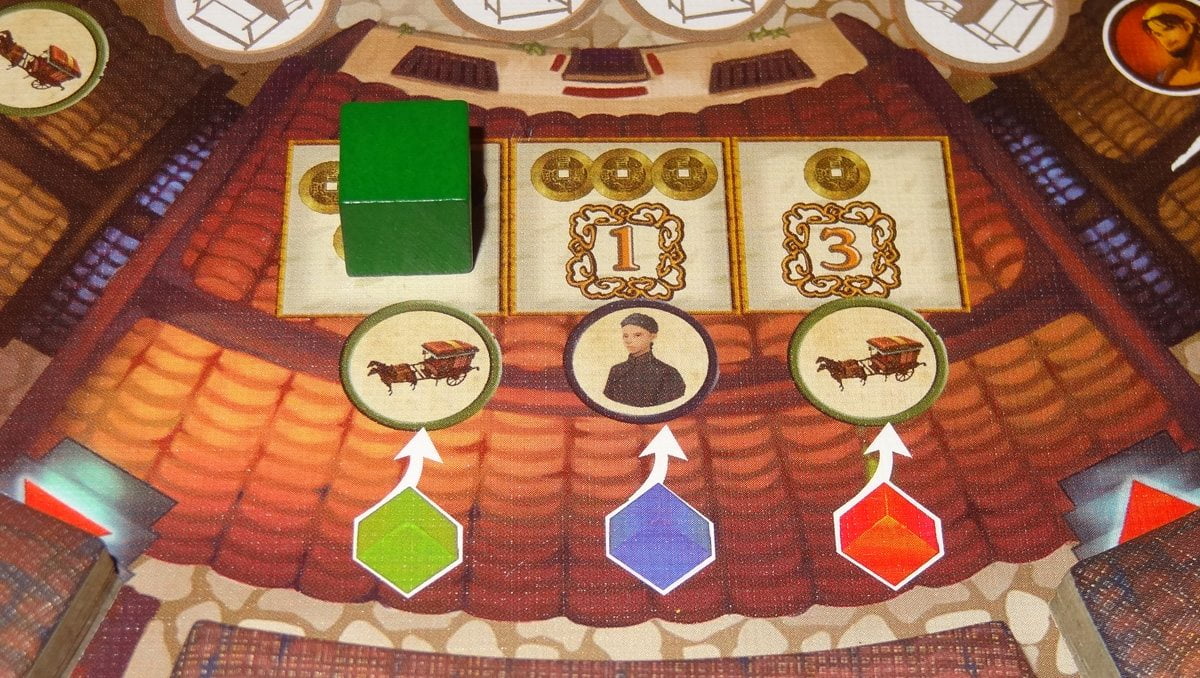
Perform room action
You may use the room where your family leader stopped. There are various locations where you can buy or sell resources, get bonus effects from the pirates, or even cash in money for points. Some tiles have markets (such as the one pictured above), in which you place the cubes you are selling into the corresponding space—the resources will stay there until the entire market is filled, and then they are cleared off. Other players may not sell to the same space until the it is cleared.
There are several icons that represent actions: the assistant icon allows you to hire one of your assistants, moving it from the track at the top of your player board into your supply. The chair icon allows you to put an assistant from your supply onto one of the chair spaces on the inner ring of the round house. The card icon lets you take an expert card from the supply (refilling from the deck afterward). The pirate icon lets you take the bonus from one of the face-up pirate tokens, cycling it to the bottom of the stack. Finally, the horse-drawn cart lets you take a traveling merchant action (explained below).
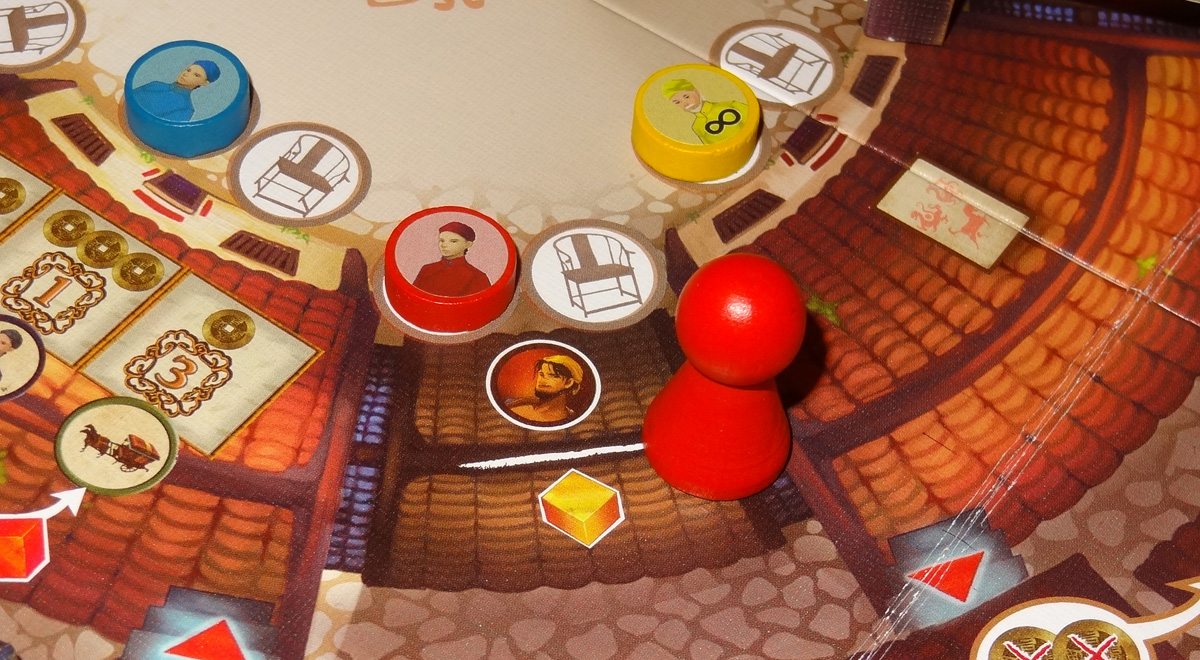
When you use a room in the inner ring, you may use assistants seated at that room to take the action again, placing them back into your supply. Each room has two seats, so if your assistants occupied both of them, you could activate a room up to three times in a single turn. Senior assistants (with the infinity symbol) are permanent, so they stay in the seat even after you use them to activate the room.
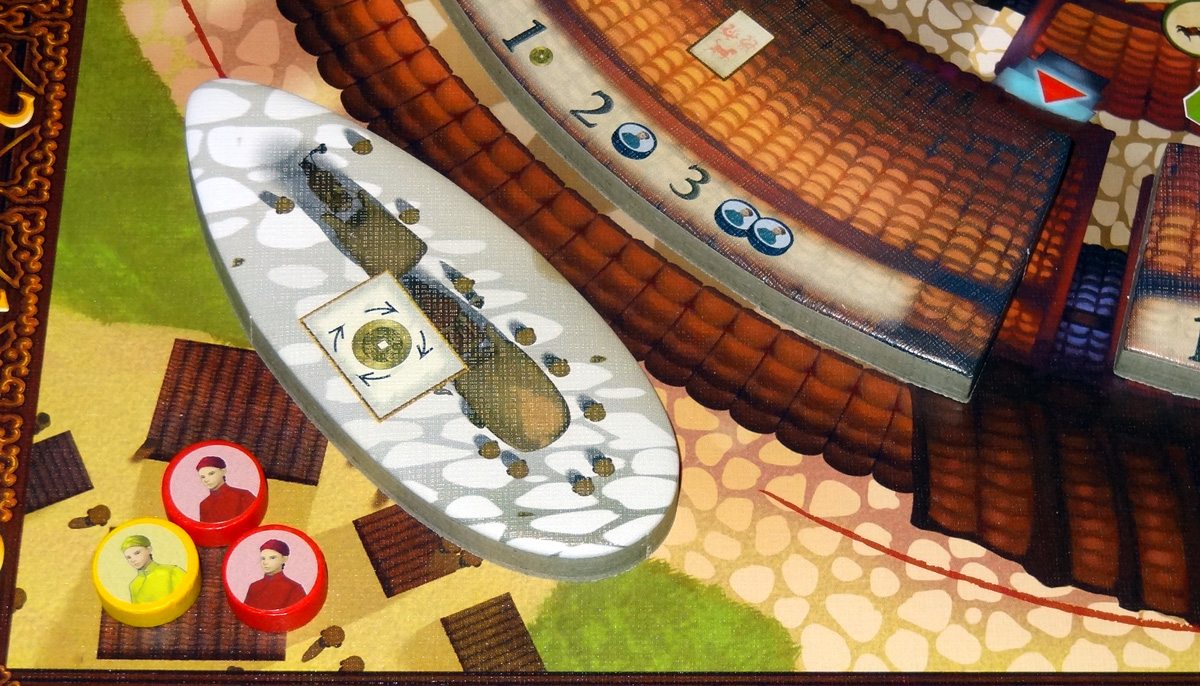
When you take a traveling merchant action, you may place an assistant from your supply into the village where the traveling merchant tile is located. Before and after placing the assistant, you may pay to move the merchant clockwise, one coin per move. Generally, placing multiple assistants in the same village is better, so it may be worth paying to move the merchants to a village where you already have assistants. Likewise, if another player has several assistants in a village, you might pay to move the merchant past that village so they have to pay to move the merchant back later.
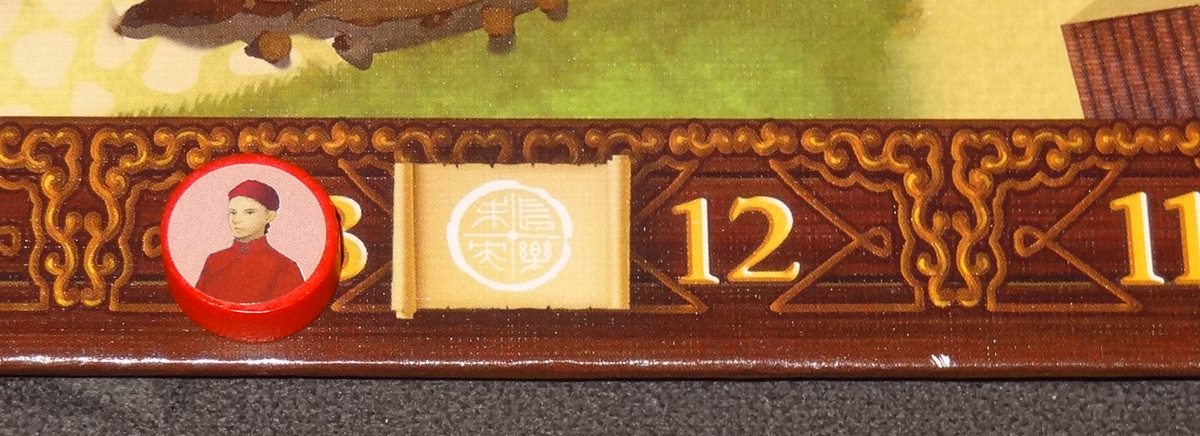
Gain bonus
The score track has several scroll icons on it. For every scroll you pass during your turn, you will gain one bonus. For each bonus earned, you may take either one of the face-up order cards from the supply, or one of the face-up amulet tokens, drawing a new one to replace it.

Fulfill orders
At the end of your turn, you may fulfill any of your open order cards by paying the required resources or money to the supply. Gold resource cubes are wild and may be substituted for any resource. After completing an order, the order card is flipped over, showing its point value and passive bonus. Note: you do not score the points at this time; orders are calculated at the end of the game.
Order cards vary in point value, and each has a passive bonus (also shown on the front of the card). Once you’ve completed an order, you will get that bonus, which may give you points, coins, or resources every time you gain a particular thing. For instance, you might score points each time you take a red resource cube, or get an extra green cube every time you take a green cube. Note that passive bonuses are limited to one use per turn.
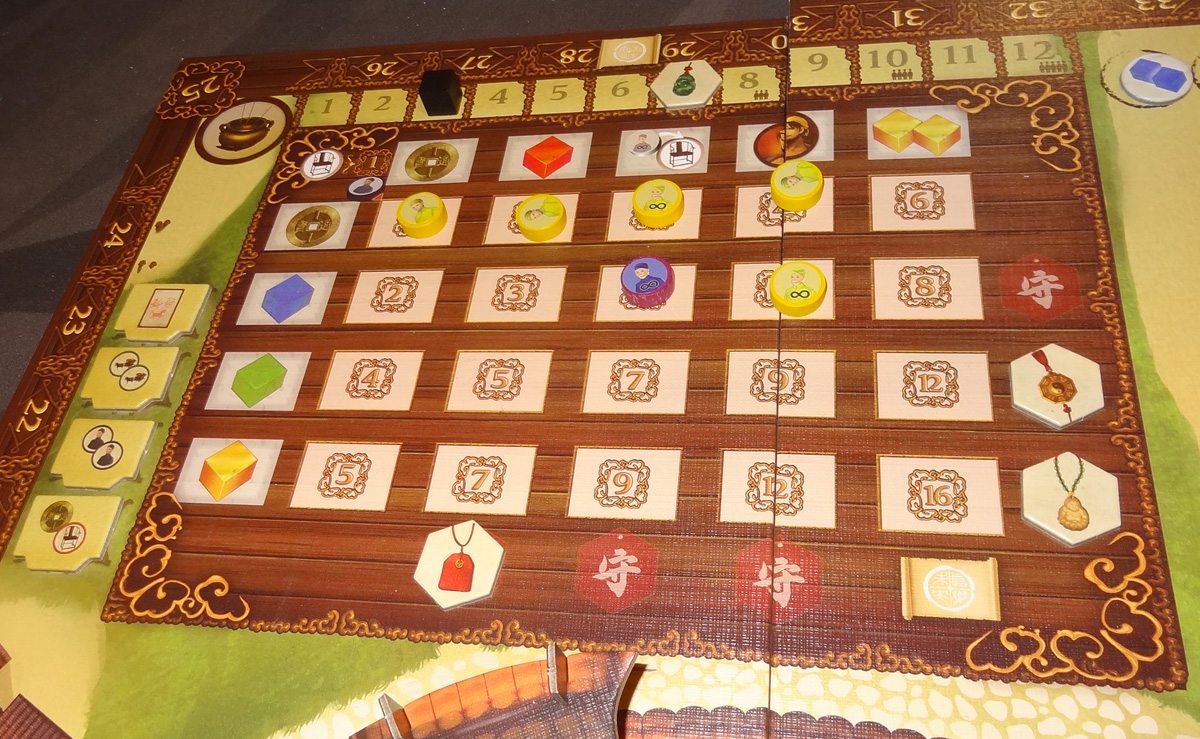
Worship
If you end your movement on the ancestral hall, instead of using a room, you must take the worship action. First, you advance the round marker one space—if you move onto the amulet on the turn track, you claim it. Then there are two options: use a temple token, or worship the ancestors.
If any of the four temple tokens to the left of the grid are still face-up, you may claim the bonuses shown on one and then flip it face-down.
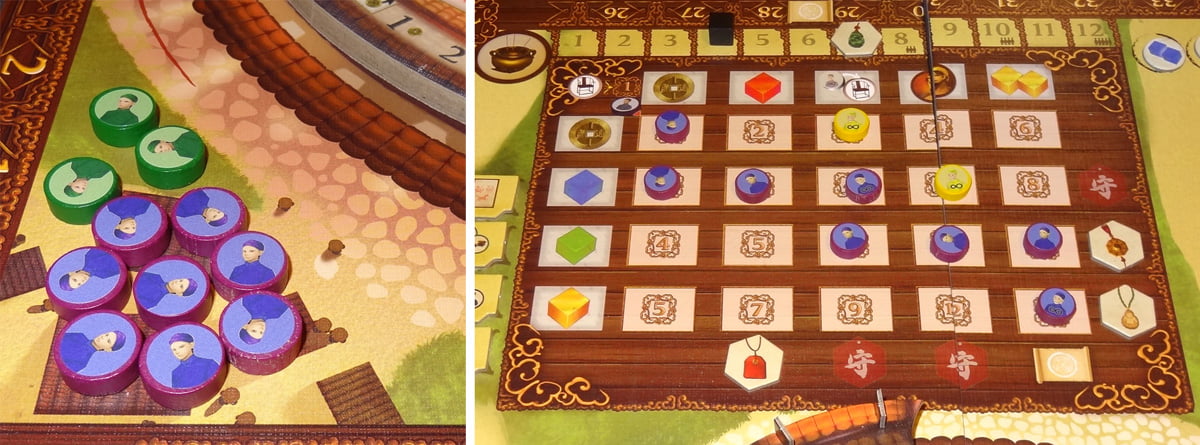
To worship the ancestors, you pick up all of your assistants from one of the four villages, and place them onto the worship grid, starting from the top left corner. You must place all of the assistants, forming a chain, and you may only have one of your assistants on each space of the grid. (You may share spaces with other players’ assistants.) The last assistant you place is flipped over to the permanent side, which will determine your points and bonuses earned.
You gain the points printed on that space, plus one point per assistant that you have in a seat in the round house. You also gain both of the bonuses printed at the top of the grid and the left side of the grid. Note the bonus in the center column is the only way you can place a permanent assistant in a seat in the round house. Finally, you may take one of the bonuses (typically amulet tokens) at the bottom or right side of the grid, if there are any available.
After you’ve collected your points and bonuses, you remove all of your assistants except those that are permanent. Those will stay, allowing you to use them on later worship actions as a bridge (but they also block that scoring space for you in the future).

Game End
When the round marker reaches the amulet on the round track, that player claims the amulet, and then the game end is triggered. Each other player will get one more turn, and then the game ends.
You score points for:
- Sets of unique amulets according to the chart on your player board
- 1 point per assistant in the round house or in villages (not on the worship grid)
- Completed order cards
- Assistants and resources left in your supply are turned into 1 coin each, and then you score 1 point per 3 coins
- Family: if you hired enough assistants to reveal the points on the assistant track on your player board, you will score 4 bonus points or 12 bonus points
The highest score wins, with ties going to the player with the most coins.

Why You Should Play Round House
I’m always curious to see games that were designed by non-Westerners, because I like to see how they use game mechanics and themes and whether the games feel different than those designed by Americans and Europeans. Quite often there are things that seem familiar, and then other aspects that feel unusual or unexpected. Round House has an Asian theme and is designed by two Taiwanese designers, Eros Lin and Zhong-Hua Yang, but it definitely feels like a Euro-style game. In this case, I like the familiar worker placement aspect combined with the unfamiliar “worship grid” for scoring.
At its core, Round House is a worker placement game: you put your worker in a particular space to use that space’s effect, blocking other players from using that space until you leave. However, you’re limited to moving in a clockwise path around the board, and you can only switch between the inner and outer rings at certain points, which limits the types of actions you can string together on subsequent turns. On top of that, every time one of your family leaders makes a full revolution back to the ancestral hall, you’ll take a worship action, which also brings you one step closer to the end of the game.
As with many other worker placement games, it’s always important to consider not only what will advance your own interests, but what may also block your opponents’ interests. Ideally, you can kill two birds with one stone. One example of this is moving the traveling merchant so that you can group your own assistants in the same village, while also moving the merchant away from the village where your opponents have been amassing assistants—they’ll have to pay extra to circle the merchants back around, or else risk splitting up their assistants among multiple villages.

There are many ways to score points in Round House, and at first it can be a little overwhelming. Do you try to gain expert cards to get you some quick resources? Do you go about hiring assistants and placing them into chairs? Do you try to collect resources and money to fulfill orders? Or perhaps you work to place a lot of assistants into a village, so that when you worship, you can score more points at once. The various rooms (and their random placement at setup) will inform some of your decisions—perhaps there is an easy path to acquire resources on one turn, and then sell them at a profit on the next turn.
I like the various ways that the assistants come into play. First, hiring more assistants is generally beneficial, simply because you can score up to 12 extra points at the end of the game if you’ve hired all of them. There are some actions that allow you to fire assistants (putting them back onto the track) for bonus effects. But the biggest reason to hire assistants is so you can place them somewhere, whether in a seat or in a village. Getting them into villages lets you earn more points when worshiping (and reach better bonuses); placing them into the seats can give you additional actions or bonus points when you worship. It’s always a tricky balance when you have assistants in seats—do you use it for the extra action, or leave it there until after you’ve worshiped and gotten extra points? And, of course, assistants that you have on the board are worth more points than those in your supply at the end of the game, so every time you use an assistant (whether to worship or for an extra action) is effectively costing you a point.
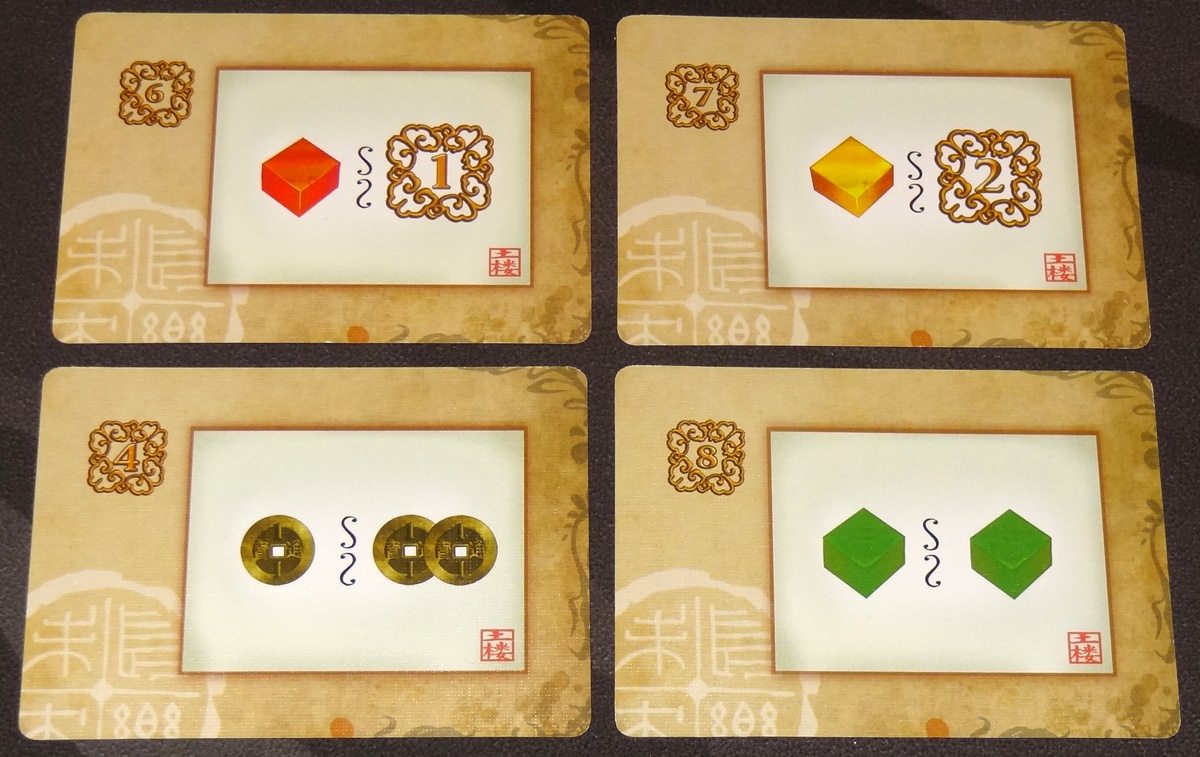
Fulfilling orders can get you a lot of extra points, and those passive bonuses can really start to pile up. If you focus your orders, you may find yourself scoring extra points and resources every time you gain a resource, which then lets you fulfill more orders, and so on. But if you focus on acquiring goods or money for orders, you may not be as prepared to worship when your leader arrives back at the ancestral hall, so there’s a tricky balancing act there.
It’s also interesting that the players collectively control the pace of the game. Every time your leader circles back around to the ancestral hall, you’ll either worship at one of the temples or else worship the ancestors and advance the round marker. Since there are only four temple tokens, eventually those may be used up and everyone who worships will advance the round marker. If everyone moves their family leaders quickly around the round house, the end will approach much more quickly—but they won’t have as much time to place assistants into villages so their worship scores will be lower. There’s sometimes a race to worship because the amulet bonuses will be taken, but you don’t want to end the game if you think you’re behind.
There are some end-game points that aren’t scored during play—the orders, assistants on the board, and amulet collections. It allows for a little bit more tension when you do the final scoring because you don’t know for sure who is ahead. Somebody who earned most of their points in-game through worshiping may find that another player surpassed them by fulfilling a lot of orders or collecting more amulets.

The pacing feels quite different depending on the number of players. While I did enjoy the 2-player game, it felt almost too easy to pursue the various scoring tactics: both of us were able to hire all of our assistants, acquire the maximum set of amulets, fulfill a large number of orders, and get a lot of assistants onto the board. It surprised me because I’m more used to games in which you just can’t do everything. But in a 2-player game, you effectively have 5 pawns that you could move on your turn (2 of your own and the 3 neutral pawns). In a 5-player game, each player only has a single pawn, and that introduces some significant changes. In particular, you will only get to travel once around the round house before you reach the ancestral hall and must stop to worship; when you have 2 pawns available, you can stop one of them just before you reach the ancestral hall, and spend a little more time preparing with the other pawn before you worship. The other thing we found in a 5-player game is that the seats filled up a lot more quickly—not only because there are more players taking seats, but also because players were using those assistants less often for extra actions. Partly that was due to wanting to hold the seats for end-game scoring, but it was also partly because players were able to block opponents from reaching the rooms where their assistants were seated.
I’ve really enjoyed playing Round House, though I have to admit that I’m still figuring out the strategy because I’ve only had a few plays so far. It’s a fairly hefty game and can be a little tricky at first because there are so many options, but once you get going things do start to click into place. I would recommend it for players who like Euro-style games, but not for those who prefer quick, casual games; although the box says 60 to 90 minutes, you should expect your first few plays to last a bit longer than that. I think with more experience, we could get it down to that estimate.
Deep Water Games just ran a Kickstarter for four other EmperorS4 titles in January, so it may seem pretty soon to be running another campaign already, but they’ve already started delivering those games so I feel comfortable that they’ll be able to fulfill this campaign on time as well. (It helps that the games have already been produced and that they aren’t getting a full re-design for the North American versions.) For more information about Round House or the other titles included in this campaign, visit the Mystery of the Temples Kickstarter page!
Click here to see all our tabletop game reviews.
If you’d like to stay up-to-date with all of our tabletop gaming coverage, please copy this link and add it to your RSS reader.
Disclosure: GeekDad received a copy of this game for review purposes.





